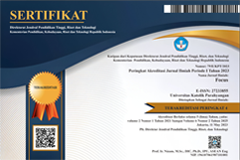Islam and the Prevention of Violence Against Children Through the Implementation of the National Movement Against Sexual Crimes
DOI:
https://doi.org/10.26593/focus.v3i2.6082Keywords:
Children, National movement, Islamic doctrines, Sexual violenceAbstract
Today, many cases of violence are widely reported in the mass media. The most recent case is the problem of sexual violence that affects children, where most of the perpetrators are acquaintances of the victim. Children become targets of violence because their position is always judged as weak, helpless, and dependent on the adults around them. This study discusses the state and religion's role in protecting children from sexual violence. This research was conducted with a sociological approach through the resource mobilization theory. The results of this study inform the definition of violence, Islamic views on children, and efforts to protect children through the National Movement Against Sexual Crimes Against Children (Gerakan Nasional Anti Kejahatan Seksual Terhadap Anak; GN-AKSA). The conclusion of this study shows that Islamic values that advocate for good care of children can be merged with GN-AKSA as an effort to protect children from sexual violence.
References
Adnan, G. (2020). Sosiologi Agama: Memahami Teori dan Pendekatan. Ar-raniry Press.
Akbar, I. (2016). Demokrasi Dan Gerakan Sosial (Bagaimana Gerakan Mahasiswa Terhadap Dinamika Perubahan Sosial). Jurnal Wacana Politik, 1(2), 107–115.
Andari, R. N., & Negara, L. A. (2017). Evaluasi Kebijakan Penanganan Kejahatan Kekerasan Seksual terhadap Anak di Indonesia. Jurnal Ilmiah Kebijakan Hukum, 11(1), 1–11.
Chant, S. (2016). Women, Girls and World Poverty: Empowerment, Equality or Essentialism? International Development Planning Review, 38(1). https://doi.org/10.3828/idpr.2016.1
Connolly, M., Crichton-Hill, Y., & Ward, T. (2006). Culture and child protection: Reflexive responses. Jessica Kingsley Publishers.
Della Porta, D. (2006). Social movements, political violence, and the state: A comparative analysis of Italy and Germany. Cambridge Univ Pr.
Fatkhurahman, M. (2016). Agama dan Ego Orang Tua (Telaah Kritis atas Spontanitas Anak dalam Pendidikan Keluarga). Cendekia: Jurnal Kependidikan Dan Kemasyarakatan, 14(2), 317–332.
Febriyani, R. (2019). Peran bimbingan konseling sufistik terhadap perkembangan jiwa anak: Studi lapangan di Yayasan Asuhan Ar-Rifqi Kecamatan Panyileukan Kota Bandung. UIN Sunan Gunung Djati Bandung.
Fitriani, R. (2016). Peranan penyelenggara perlindungan anak dalam melindungi dan memenuhi hak-hak anak. Jurnal Hukum Samudra Keadilan, 11(2), 250–358.
Galtung, J. (1969). Violence, peace, and peace research. Journal of Peace Research, 6(3), 167–191.
Hapsari, D. R. (2016). Peran jaringan komunikasi dalam gerakan sosial untuk pelestarian lingkungan hidup. Jurnal Komunikasi Ikatan Sarjana Komunikasi Indonesia, 1(1), 25–36.
Huriani, Y. (2021). Pengetahuan fundamental tentang perempuan. Lekkas.
Lisawati, S. (2019). Melaksanakan Hak-hak Anak dalam Perspektif Islam sebagai Upaya Pendidikan Agama pada Anak. Fikrah: Journal of Islamic Education, 1(2), 87–98.
Maknun, L. (2017). Kekerasan terhadap anak yang dilakukan oleh orang tua (child abuse). Muallimuna, 3(1), 66–77.
Miles, M. B., & Huberman, A. M. (2013). Qualitative Data Analysis: An Expanded Sourcebook. Sage Publications, Inc.
Noviana, I. (2015). Kekerasan seksual terhadap anak: dampak dan penanganannya. Sosio Informa: Kajian Permasalahan Sosial Dan Usaha Kesejahteraan Sosial, 1(1).
Rahman, M. T. (2021). Sosiologi Islam. Prodi S2 Studi Agama-Agama UIN Sunan Gunung Djati Bandung.
Ramadhan, A. (2021). Kementerian PPPA: 11.952 Kasus Kekerasan terhadap Anak Terjadi Sepanjang 2021, Mayoritasnya Kekerasan Seksual.
Rani, F., Kirana, K., & Ismandianto, I. (n.d.). Kebijakan Pemerintah Indonesia dalam Menangani Kasus Eksploitasi Seksual Komersial Anak di Indonesia. Nakhoda: Jurnal Ilmu Pemerintahan, 20(2), 119–130.
Ridho, M. (2015). Islamic perspective on child protection. LENTERA, 17(2).
Rudianto, Y. (2012). Fenomena kekerasan sosial dan struktur majemuk masyarakat indonesia. Jurnal Administrasi Dan Kebijakan Publik, 1(1), 67–92.
Salam, R., Pramono, D., & Putri, N. A. (2018). Children Care Mainstreaming Sebagai Upaya Pencegahan Kekerasan Terhadap Anak di Kota Semarang. Dimensia: Jurnal Kajian Sosiologi, 7(1).
Santoso, M. (2016). Islamic Perspective on The Rights of Child: Their Consequences For The Roles Of State And Civil Society (Especially in Education).
Sari, R., Nulhaqim, S. A., & Irfan, M. (2015). Pelecehan seksual terhadap anak. Prosiding Penelitian Dan Pengabdian Kepada Masyarakat, 2(1).
Setia, P., Zulaiha, E., & Huriani, Y. (2021). Perempuan dan Bisnis Online di Masa Pandemi Covid-19: Pengalaman di Kota Bandung, Jawa Barat. Az-Zahra: Journal of Gender and Family Studies, 2(1), 26–43.
Solihin, L. (2004). Tindakan kekerasan pada anak dalam keluarga. Jurnal Pendidikan Penabur, 3(3), 129–139.
Sukmana, O. (2016). Konsep dan teori gerakan sosial. Intrans Publishing.
Sulaiman, A., Jamsari, E. A., & Noh, N. C. (2015). Islamic environment in child development according to the views of Imam al-Ghazali. Mediterranean Journal of Social Sciences, 5(29), 33.
Sumampouw, N. E. J., Otgaar, H., La Rooy, D., & De Ruiter, C. (2020). The quality of forensic child interviewing in child sexual abuse cases in Indonesia. Journal of Police and Criminal Psychology, 35(2), 170–181.
Sztompka, P. (2004). The trauma of social change. Cultural Trauma and Collective Identity, 155–197.
Tarrow, S. (2022). Power in movement. Cambridge university press.
Taubah, M. (2015). Pendidikan anak dalam keluarga perspektif Islam. Jurnal Pendidikan Agama Islam (Journal of Islamic Education Studies), 3(1), 109–136.
Thébaud, S., & Halcomb, L. (2019). One step forward? Advances and setbacks on the path toward gender equality in families and work. In Sociology Compass. https://doi.org/10.1111/soc4.12700
Tukinem, T., & Waharjani, W. (2020). Mendidik anak dalam perspektif Islam (Kajian syarah Riyadhu-sh-Shalihin). Journal of Islamic Education and Innovation, 39–49.
Utami, M. U. P. (2018). Kekerasan Struktural Dan Personal Dalam Novel Candik Ala 1965 Karya Tinuk R. Yampolsky. Sintesis, 12(1), 27–37.
Wahyuni, D. (2014). Kejahatan Seksual Anak dan Gerakan Nasional Anti-Kejahatan Seksual Terhadap Anak. Info Singkat Kesejahteraan Sosial, 6.
Wismayanti, Y. F., O’Leary, P., Tilbury, C., & Tjoe, Y. (2019). Child sexual abuse in Indonesia: A systematic review of literature, law and policy. Child Abuse & Neglect, 95, 104034.
Zaki, M. (2014). Perlindungan anak dalam perspektif islam. ASAS, 6(2).

Downloads
Published
Issue
Section
License
Copyright (c) 2022 Naila Farah, Lutfiana Nisarohmah, Ratri Wulandari, Tryana Hafilda Dewi

This work is licensed under a Creative Commons Attribution-ShareAlike 4.0 International License.



















